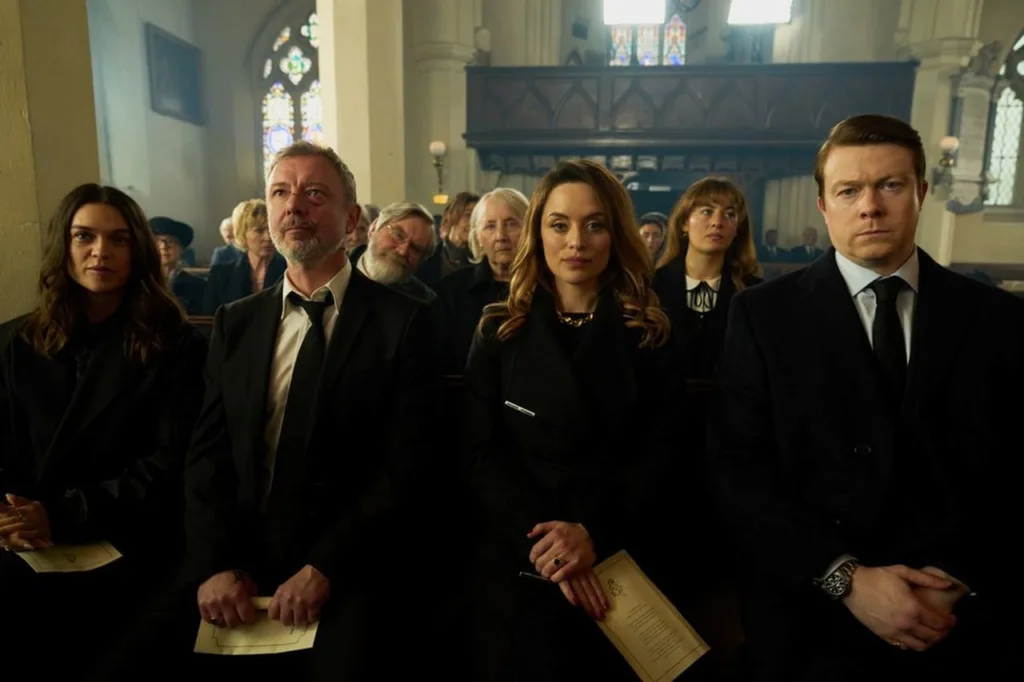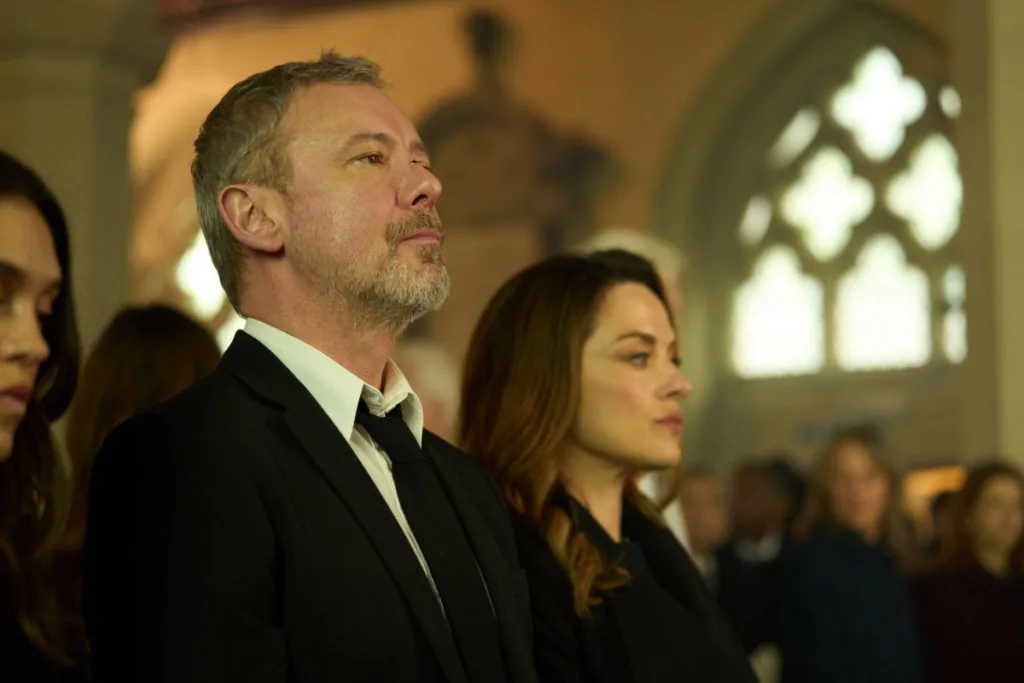From the moment a lifeless figure is discovered in a dusty pigeon loft, I, Jack Wright drags us into a chamber of rituals: the solemn gathering, the crack of the lawyer’s ledger, the will proclaimed like an oracle’s verdict. Jack’s sudden absence reveals itself less as an end than a threshold to revelation—each beneficiary framed in the cold light of familial obligation, greed and unspoken grief. That single act of reading seals destinies, fractures loyalties and summons questions that refuse easy answers.
Chris Lang, whose reputation was etched in the hushed corridors of Unforgotten, pulls these six chapters into focus with both deft precision and an appetite for moral uncertainty. Commissioned by UKTV’s U&Alibi and destined for broader audiences on BBC One, the series feels wrought from careful design: each hour a modular piece of a larger game, measured yet restless. The writing carries the weight of old crime novels, yet it pulses with modern unease—questions of worth, legacy and the silent bargains we strike with our own mortality.
Visually, the drama balances opulence and shadow: sunlit panelled halls collapse into rainy exhumations; gleaming boardrooms give way to interrogation rooms where a detective’s quiet observations cut like scalpels. Threaded through it all are candid “true-crime” confessions—moments when guilt flickers across a face, and we catch the echo of conscience. Suspense arrives not only in hidden motives but in the stillness between revelations, as if every frame waits for the next truth to betray it.
A Web of Secrets and Echoes
From the moment Jack’s body lies still among the cooing of trapped pigeons, a hush falls that feels both intimate and alien—death as an absurd ritual. His apparent suicide in that loft is an invitation to confront absence itself: a father who speaks only through silence, and a family drawn like moths to the flicker of his final testament. When the lawyer’s voice cuts through that silence, naming heirs and rebels in equal measure, we witness yearning unravel into suspicion.
Multiple currents surge beneath the surface. Sally protests with the precision of a wronged widow, her legal challenge a moral plea against his posthumous decree. The detective tracks footprints of motive and blood alike, each clue a fractal of human frailty. In boardrooms and parlors, the Wright sons circle their bloodline’s carcass: one craving validation, the other drowning in debts he cannot repay. Every handshake, every sideways glance, hints at a ledger of grudges.
Moments spun forward, the faux-documentary interviews arrive at chapter’s end like echoes from another existence. Characters confess, recall, deflect—each fragment of testimony tilts the scale of empathy. A child’s glance, years later, feels heavy with foreboding; remorse glitters like broken glass.
Revelations unfold with a measured urgency. A hidden romance resurfaces; a ledger entry becomes a weapon. Cliffhangers flare as motives shift, then dim into quieter questions about guilt’s true shape. Time itself fractures when present-day scenes collide with glimpses of futures etched in remorse or defiance. Those voice-overs hover between confession and evasion, guiding our expectations even as they remind us that memory is a sieve—what seeps through may not be whole.
Portraits of Inheritance and Oblivion
Jack Wright’s presence is felt more acutely in his absence than in his brief on-screen moment. Trevor Eve imbues the patriarch with a silent gravity—his empire built on brick and secret calculations, his legacy a ledger of unspoken cruelties. Though he speaks little, his omissions resonate like a philosopher’s void: what remains when a life is reduced to clauses in a will?
In contrast, Gray Wright storms into view like an electric chord played too loud. John Simm’s record-producer-turned-heir-to-nothing is a portrait of ceaseless appetite and perilous debts. The earring glints with reckless bravado; the bruised eye hints at battles fought in dimly lit backrooms. His laughter trembles on the brink of hysteria, and one wonders whether his volatility is a shield or a confession of hopelessness.
Daniel Rigby’s John Wright, the dutiful son, moves in measured steps—as though his inheritance were entitlement itself. He wears his Savile Row shirts like armor, yet they feel too tight. By mid-season, that composure fractures; the son who thought himself natural heir discovers the yawning distance between duty and desire. When he hesitates, you sense a man confronting the existential question: who am I if I am not what my father made me?
Nikki Amuka-Bird’s Sally is equilibrium in motion. She inhabits grief with fierce tenderness, then pivots to legal strategist, her vulnerability sharpened into resolve. She reminds us that mourning is a battlefield of shifting loyalties. With each glance, betrayal and cunning collide.
Zoë Tapper’s Georgia channels a modern-day Lady Macbeth, her ambition a slow-burning fever. She tips conversations into schemes, her words laced with disquiet. In her silence, you hear centuries of feminine unrest—what lengths will one go to claim power?
Ruby Ashbourne-Serkis, as Emily, stands apart: a technological oracle in a world rooted in brick. She inherits shares and generational disillusion, her gaze oscillating between pragmatism and fleeting empathy. The tension she carries is a question about new legacies supplanting old bloodlines.
Around them swirl the ensemble: Harry Lloyd’s DCI Hector Morgan, impervious yet inquisitive; Gemma Jones’s Rose, bearing the weight of first loves; James Fleet’s Bobby, a calm center in emotional storms; Niamh Cusack’s Annie, watchful and unmoored; and the specter of the missing Asher, whose absence fractures every scene. Each performance is a prism, refracting our own fears about family, power and what endures when all else collapses.
The Currency of Ruin
Wealth in I, Jack Wright glistens like a promise only to reveal its brittle core. Jack’s fortune, once a beacon of ascent, becomes the fulcrum on which familial bonds teeter—siblings eye each other with sharpened intent, spouses recalibrate affection as if it were stock to be traded. Money offers solace but delivers emptiness; its echo rebounds through empty boardrooms and half-lit estates, reminding us that abundance can hollow out the soul.
Beneath this opulence lies a tapestry of betrayal. Gray and John circle one another with wary grace, each wounded by old grievances; alliances shift like sand as marriages strain under whispered resentments. The wedding vows dissolve into contracts, and blood ties thin into mere calculations of advantage. In every whispered conversation, we catch the tremor of love’s betrayal, a sibling’s glance that harbors quiet retribution.
Truth here is a malleable thing. The courtroom’s sterile proceedings clash with the detective’s moral compass, each seeking justice in separate arenas. Yet the “documentary” asides upend both, refracting confession and evasion through intimate stares to camera. We, too, become judges—complicit in choosing which narrative we trust.
Amid these currents, identity fractures under the weight of self-interest. Some seek genuine redemption, others cage their grief behind litigation. Emily’s digital savvy looms as a challenge to her family’s brickbound legacy, hinting at a future where tradition is outpaced by innovation—and where even memory can be rewritten.
Architectures of Alienation
Manicured lawns and ivy-clad facades in the Wright family’s country estate seem to breathe with a latent disquiet—each corridor a silent witness to whispered schemes. In contrast, London boardrooms gleam under fluorescent honesty, where glass walls encode ambition. Parisian apartments, with their sunlit parquet floors, feel like fragile sanctuaries for grief, at once inviting and alien.
The camera’s eye shifts between widescreen solemnity and handheld urgency. At the will reading, a broad frame captures the tableau of expectancy, each heir poised like a reluctant actor in a morality play. Later, in cramped back alleys and interrogation rooms, the lens quivers, anchoring us to the characters’ fractured nerves.
Opulent panelled walls and heirloom furniture evoke centuries of tradition; across the table, Emily’s sleek tech prototypes signal a rupture with inherited stone. Suits cut from Savile Row cloth press like rules against the skin, while Gray’s scuffed leather jacket and paint-splattered studio jeans suggest a recklessness born of desperation.
Warm amber light softens family reunions; in murder investigations, blue-tinted lamplight casts harsh geometries on faces drawn tight by doubt. Scattered props—loan-shark letters stained with coffee rings, faded photo albums, half-completed app sketches—serve as silent oracles, each object refracting the characters’ histories and hinting at futures yet unwritten.
The Echoes Between Silence
An uneasy chords thread through the series, each note a pulse of latent dread. The original score hovers at the edge of our hearing—sparse piano motifs shiver beneath dialogue, then swell into brooding strings as secrets strain for release. Gray’s world, by contrast, is awash in diegetic beats: muffled basslines bleed from his studio, grounding his chaos in a tactile rhythm. In those moments, music becomes confession, an unfiltered outcry against inherited emptiness.
The editing moves with a restless heartbeat. Present-day tension snaps to flash-forwards in mid-gesture, fractures time like a fractured self. A montage of hurried footsteps, darting eyes and legal documents spins revelations into the viewer’s bloodstream—clues that flicker as we chase meaning through these shards. Cuts land with the precision of a blade, yet sometimes linger too long, letting uncertainty seep into the spaces between scenes.
Ambient soundscape deepens the world’s gravity. Footfalls echo off marble floors, reminders of lives played out on polished surfaces. In boardrooms, chairs scrape like whispered threats; in family homes, the hum of distant traffic underscores isolation.
Courtroom murmurs drift, a backdrop of communal judgment. Even the hush of an abandoned loft resonates, as if walls remember the weight of final breaths. In this tapestry of sound, silence whispers its own secrets—sometimes the loudest confession of all.
Verdict Amidst the Shadows
This drama grips like a chord struck in minor key: family tension and murder intrigue intertwine, each revelation scored with dark wit. Central performances blaze with authenticity—Simm’s raw magnetism, Amuka-Bird’s fierce vulnerability and Lloyd’s composed scrutiny anchor the narrative. The faux-documentary bookends lend an unsettling clarity, turning confession into weapon.
At times, the tapestry feels stretched too thin: subplots collide until edges blur, and a few supporting figures drift in the margins rather than shifting the plot’s gravity. The “to-camera” moments can jar, their artifice cracking the spell just as suspense reaches its peak.
While the show shares Succession’s keen eye for dynastic decay and echoes classic whodunits, it carves its own avenue by weaving existential unease into every inheritance fight. Its moral stakes feel more personal, less gilded spectacle.
Anyone drawn to corrosive family dramas or labyrinthine mysteries will find plenty to savor. A weekly release may best allow the dark questions to echo; binge-watching risks swallowing nuance whole. This is a feast of ambition and regret—uneven in places but alive with philosophical shadows. It demands your attention, then lingers in the silence it leaves behind.
Full Credits
Director: Tom Vaughan
Writer: Chris Lang
Producers and Executive Producers: Chris Lang, Tom Vaughan
Cast: Nikki Amuka-Bird, John Simm, Gemma Jones, Daniel Rigby, James Fleet, Zoë Tapper
The Review
I, Jack Wright
I, Jack Wright weaves a haunting family saga and murder mystery into a single, restless pulse. Its cast delivers raw, magnetic performances, and the true-crime interview device injects unsettling clarity into each secret. Though its many subplots sometimes crowd the margins, the show’s philosophical spine and visceral style carry it through. It challenges viewers to confront legacy, guilt and the hollow promise of wealth, leaving threads that linger long after the credits roll.
PROS
- Compelling blend of family drama and whodunit intrigue
- Powerful central performances (Simm, Amuka-Bird, Lloyd)
- Inventive “true-crime” interview framing
- Rich, moody production design and cinematography
- Philosophical undercurrents on wealth and legacy
CONS
- Occasional subplot overcrowding
- Some supporting characters underdeveloped
- Interview segments can interrupt narrative flow
- Tone shifts between dark drama and black comedy


















































